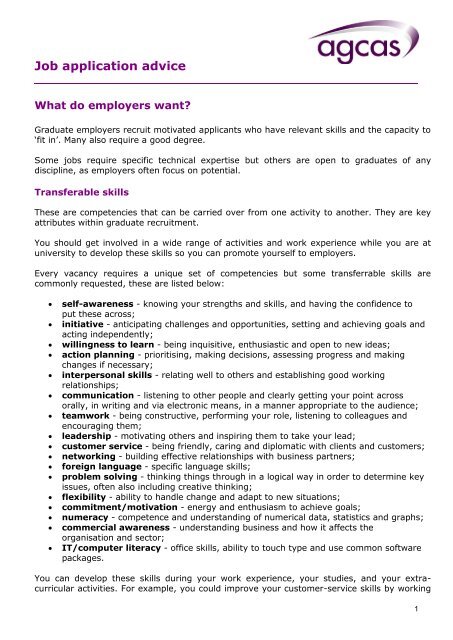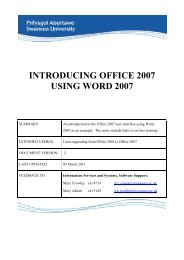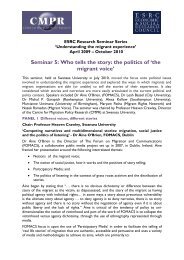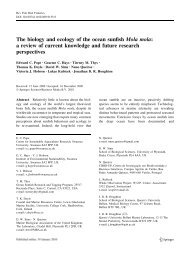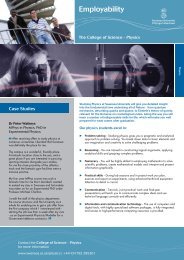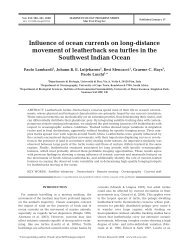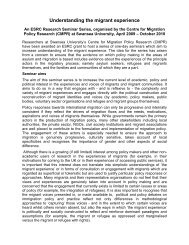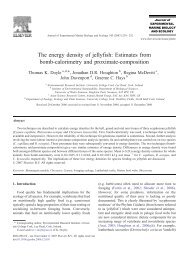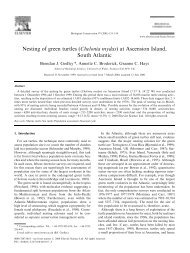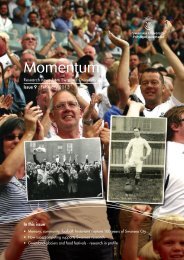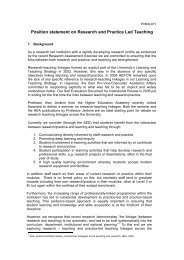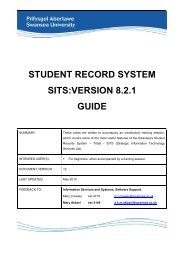Job application advice
Job application advice
Job application advice
You also want an ePaper? Increase the reach of your titles
YUMPU automatically turns print PDFs into web optimized ePapers that Google loves.
<strong>Job</strong> <strong>application</strong> <strong>advice</strong><br />
What do employers want?<br />
Graduate employers recruit motivated applicants who have relevant skills and the capacity to<br />
„fit in‟. Many also require a good degree.<br />
Some jobs require specific technical expertise but others are open to graduates of any<br />
discipline, as employers often focus on potential.<br />
Transferable skills<br />
These are competencies that can be carried over from one activity to another. They are key<br />
attributes within graduate recruitment.<br />
You should get involved in a wide range of activities and work experience while you are at<br />
university to develop these skills so you can promote yourself to employers.<br />
Every vacancy requires a unique set of competencies but some transferrable skills are<br />
commonly requested, these are listed below:<br />
<br />
<br />
<br />
<br />
<br />
<br />
<br />
<br />
<br />
<br />
<br />
<br />
<br />
<br />
<br />
<br />
<br />
self-awareness - knowing your strengths and skills, and having the confidence to<br />
put these across;<br />
initiative - anticipating challenges and opportunities, setting and achieving goals and<br />
acting independently;<br />
willingness to learn - being inquisitive, enthusiastic and open to new ideas;<br />
action planning - prioritising, making decisions, assessing progress and making<br />
changes if necessary;<br />
interpersonal skills - relating well to others and establishing good working<br />
relationships;<br />
communication - listening to other people and clearly getting your point across<br />
orally, in writing and via electronic means, in a manner appropriate to the audience;<br />
teamwork - being constructive, performing your role, listening to colleagues and<br />
encouraging them;<br />
leadership - motivating others and inspiring them to take your lead;<br />
customer service - being friendly, caring and diplomatic with clients and customers;<br />
networking - building effective relationships with business partners;<br />
foreign language - specific language skills;<br />
problem solving - thinking things through in a logical way in order to determine key<br />
issues, often also including creative thinking;<br />
flexibility - ability to handle change and adapt to new situations;<br />
commitment/motivation - energy and enthusiasm to achieve goals;<br />
numeracy - competence and understanding of numerical data, statistics and graphs;<br />
commercial awareness - understanding business and how it affects the<br />
organisation and sector;<br />
IT/computer literacy - office skills, ability to touch type and use common software<br />
packages.<br />
You can develop these skills during your work experience, your studies, and your extracurricular<br />
activities. For example, you could improve your customer-service skills by working<br />
1
on the customer service desk in a supermarket, or demonstrate your teamwork skills in a<br />
group project at university.<br />
Work experience/volunteering<br />
Employers greatly value work experience because:<br />
<br />
<br />
<br />
it clearly demonstrates skills and motivation;<br />
skills are easily transferable;<br />
it delivers experience of the workplace.<br />
Voluntary experience is usually as highly valued as paid work. According to Andrea Grace<br />
Rannard, Head of Student Volunteering, Volunteering England:<br />
"Volunteering provides an insight into a profession and a company, allows an individual to<br />
build confidence in a role, develop or enhance relevant skills, generate useful contacts that<br />
can offer "insider" knowledge, and potentially lead to paid positions. Overall, it is a great way<br />
of improving a CV."<br />
Start out by getting any general work experience to put on your CV - your university careers<br />
service should be able to help. Then you could get experience that is more relevant to your<br />
chosen career, perhaps even an internship at the end of your penultimate year (but apply<br />
early).<br />
Relating skills to job opportunities<br />
In order to promote your skills effectively you should outline:<br />
<br />
<br />
<br />
when you have demonstrated the skills required (using specific examples);<br />
how you have performed them to a high level;<br />
a positive outcome.<br />
For example, you could prove your problem solving skills by outlining a specific problem at<br />
work when you weighed up possible solutions, sought <strong>advice</strong>, trialed different resolutions and<br />
effectively communicated your decision, resulting in a solution.<br />
Your <strong>application</strong><br />
Employers use <strong>application</strong> forms to assess your motivation and skills (and your spelling,<br />
grammar and punctuation). Questions are designed to assess specific attributes, so<br />
applicants can be compared systematically.<br />
Before putting pen to paper, carefully research the organisation, the industry and the role<br />
to determine:<br />
<br />
<br />
the skills you need to promote;<br />
what attracts you to the job (your specific motivations).<br />
You can usually find vacant positions and <strong>application</strong> procedures in the „About us‟ or<br />
„Careers‟ section of company websites.<br />
2
Remember - this is a chance for you to promote your relevant qualities so clearly state<br />
what you have to offer and why you should be considered.<br />
Education<br />
Most <strong>application</strong> forms ask you to list all your qualifications and your current education. If<br />
there is little space you may be able to:<br />
<br />
<br />
<br />
summarise key results or module titles;<br />
add a separate sheet;<br />
insert details into the additional information box.<br />
If in doubt, contact the employer to confirm the best strategy.<br />
For non-UK qualifications, you may need to state their UK equivalency. This is usually<br />
done by providing details of how many UCAS points they equate to.<br />
The Universities and Colleges Admissions Service (UCAS) has information on the<br />
comparability of international qualifications as does ENIC-NARIC, which can be accessed<br />
by most careers advisers.<br />
Employment/work experience<br />
List your jobs in reverse chronological order. Include your job title, the name of the<br />
organisation and the name of the town (plus the country if it is overseas).<br />
Describe the responsibilities and achievements in your previous roles that relate to the<br />
skills required in the job you are going for. You can group together or prioritise some<br />
experiences if space is limited.<br />
Interests and achievements<br />
Relate your extra-curricular activities to the skills required. It is more important to<br />
demonstrate relevant skills than list amazing achievements.<br />
References<br />
One of your referees should be work-related, e.g. a manager at work, and one should be<br />
an academic at university – most people use their personal tutor. Follow these tips:<br />
<br />
<br />
<br />
<br />
share your career aspirations and achievements with your referees;<br />
always get permission;<br />
provide their full name and title, postal address, email address and phone number;<br />
keep them informed about the jobs you are going for.<br />
Checklist<br />
<br />
<br />
<br />
<br />
<br />
Print the form (if possible) and check your work before sending it out.<br />
Ask someone to read through it as you might not be able to see your own mistakes.<br />
Keep a copy of your <strong>application</strong> form along with the job advert/job description to<br />
prepare for your interview.<br />
Carefully check your spelling and grammar as poor English is the main reason why<br />
most <strong>application</strong>s are rejected.<br />
Use short sentences/paragraphs which are easy to follow.<br />
3
Use one idea per paragraph and state the key information in the first sentence.<br />
Be concise.<br />
Avoid jargon.<br />
Use active verbs.<br />
Do not repeat yourself.<br />
Online <strong>application</strong>s<br />
Most large graduate recruiters now take <strong>application</strong>s online. They use sophisticated<br />
systems which enable you to build your education/employment profile and answer specific<br />
questions. You may also be able to upload other documents such as a CV and a covering<br />
letter.<br />
Access<br />
When you first register your <strong>application</strong> on an organisation‟s website you will usually be<br />
given a password which will enable you to save your work when you need a break. If you<br />
have a few <strong>application</strong>s on the go, make sure you have some way of remembering all your<br />
passwords. Modern online <strong>application</strong>s can usually be amended as many times as you<br />
want, before the closing date, and printed off, but this is not always the case. Follow these<br />
tips:<br />
<br />
<br />
<br />
familiarise yourself with the particular <strong>application</strong> system before you start;<br />
regularly copy your answers into your normal word processor to save them in case<br />
the system crashes;<br />
avoid filling in the form at the last minute because the organisation‟s server could<br />
be overloaded and you may miss the deadline.<br />
Style<br />
Just like all <strong>application</strong>s, your answers should be formal and targeted at the skills required. The online<br />
system will probably restrict you to a particular text format (e.g. font size and style), be aware of this<br />
when you draft your answer.<br />
Accuracy<br />
Online <strong>application</strong>s are often less carefully completed than old-fashioned forms – do not<br />
fall into this trap.<br />
<br />
<br />
<br />
<br />
<br />
<br />
Make sure your word-processor‟s spell-check is set to assess English as it is written in<br />
the UK (not the USA).<br />
Check your spelling using the spell-check.<br />
Personally check your spelling and grammar.<br />
Make sure you have comprehensively answered every part of every question.<br />
Check you have stuck within the stated word (or character) limit. Many forms will force<br />
you to do this, but not all.<br />
Get someone else to check your answers, preferably a careers adviser.<br />
Personality profiling<br />
4
Some <strong>application</strong> forms include multiple-choice questions about your likes, strengths and<br />
preferences. These can be used to identify whether your preferred style of working fits<br />
with the culture of the organisation and the skills they require. Be as honest as possible –<br />
some questions might be repeated to ensure your answers are consistent and some may<br />
test whether you are trying to make a favorable impression.<br />
Select Simulator is an online resource designed to help students and graduates with online<br />
<strong>application</strong>s.<br />
Example questions<br />
Application form questions usually assess:<br />
<br />
<br />
<br />
how your education, work experience and extra-curricular activities relate to the<br />
vacancy;<br />
why you want to work in that particular role/organisation/industry, i.e. your<br />
motivation;<br />
your skills that are relevant to the role.<br />
You should answer questions concisely and include key words from the job<br />
advert/description. Some questions are long and complicated – make sure you answer<br />
each specific section.<br />
Sometimes, it can be very difficult fitting your answer into the word limit provided. If this<br />
is the case, write whatever comes into your head and edit your work later by getting rid of<br />
too much detail and anything you have repeated.<br />
Different forms may look similar but the questions may differ slightly, so do not cut and<br />
paste your answers from previous <strong>application</strong>s without amending what you have written.<br />
Common questions<br />
Some typical questions are outlined below along with <strong>advice</strong> on how they should be<br />
tackled.<br />
Please outline your work experience. Provide details for each of your roles<br />
including the dates you undertook that activity, the name of the organisation,<br />
your job title and responsibilities.<br />
Relate your responsibilities to the vacancy. List your relevant roles, even if they were not<br />
necessarily your main duties. For example, if you are going for a job as a primary school<br />
teacher and you have worked in a fast food restaurant you could list your responsibilities<br />
as follows:<br />
„Maintaining excellent customer service for a wide range of people, managing parties for<br />
children, ensuring that activities were fun and safe and working in a close knit team‟<br />
Give details of your main extracurricular activities and interests to date. What<br />
have you contributed and what have you got out of them?<br />
This question is designed to assess two key elements:<br />
5
your motivation to get involved in activities outside the curriculum;<br />
your ability to relate your extracurricular activities to the specific skills required in<br />
the vacancy.<br />
To answer this sort of question, identify the key skills required by the specific recruiter and<br />
outline recent activities which clearly demonstrate your ability to carry them out. You<br />
should also explicitly outline how your experiences and achievements have prepared you<br />
for that specific role.<br />
What is your greatest achievement to date?<br />
This question is similar to the previous one but you can also outline an activity at<br />
university.<br />
You should emphasise why you consider your achievement to be „great‟ in relation to the<br />
vacancy requirements, plus state what the experience has taught you. This may be picked<br />
up for further discussion in an interview.<br />
What attracts you to our firm?<br />
Show that you have a clear understanding of the organisation‟s values and ethos and that<br />
they match yours. The more research you do, the better, as it demonstrates a real<br />
motivation to work for that specific organisation. Look on their website and trawl the<br />
internet to find genuine reasons for applying.<br />
If you can visit their stand at a careers event, ask their representatives what they enjoy<br />
about working for that firm, and quote them in your answer (using their full names).<br />
What attracts you to this role and this service line?<br />
Here, you need to demonstrate a clear understanding of the job you are going for and that<br />
you have carefully assessed that it suits your interests and motivations. Again, take some<br />
time to find out as much as you can about the role and clearly state the specific elements<br />
that you find attractive.<br />
Competency-based questions<br />
These assess your relevant skills to succeed in the role. Typically, you need to outline a<br />
specific example of when you have demonstrated a particular skill, how you have<br />
performed it well (in detail), and the positive outcome.<br />
Stress your personal contribution and use recent examples from each walk of life,<br />
especially your work experience.<br />
Typical competency questions include:<br />
Give an example of a problem you have solved that required analysis. What<br />
methods did you use and what conclusions did you reach?<br />
<br />
<br />
Briefly outline a situation where you have solved a problem (10% of your answer).<br />
Outline the strategy you personally used to solve the problem. For example, you<br />
could highlight your initiative, creativity or effective use of resources (80% of your<br />
answer).<br />
6
Give a brief positive ending that puts you in a good light (10% of your answer).<br />
Describe a time when you were working under pressure with competing<br />
deadlines and it was impossible to meet them all. What was the situation and<br />
what did you do?<br />
<br />
<br />
<br />
Briefly outline a situation where you have demonstrated your ability to work under<br />
pressure. Try to pick an example that reflects well on your organisational skills<br />
(10% of your answer).<br />
Outline the strategy you personally used to succeed under pressure. For example,<br />
you could highlight how you prioritised tasks, made efforts to renegotiate the least<br />
urgent deadlines, delegated tasks to others and communicated progress (80% of<br />
your answer).<br />
Give a brief positive ending that puts you in a good light (10% of your answer).<br />
Tell us about an occasion when you had to communicate complex information.<br />
Why did you have to do this and how did you go about it? Did you achieve your<br />
desired result?<br />
<br />
<br />
<br />
<br />
Briefly outline a situation where you have demonstrated your ability to<br />
communicate complex information (10% of your answer).<br />
Outline why you had to do this (10% of your answer).<br />
Outline the strategy you personally used to communicate effectively. For example,<br />
you could highlight how you listened empathically, responded quickly and<br />
sensitively to people‟s queries, used clear and succinct written communication, and<br />
appropriate body language (70% of your answer).<br />
Give a brief positive ending that puts you in a good light (10% of your answer).<br />
Describe a difficult team project you have worked on, the result that was<br />
achieved and how you achieved it.<br />
<br />
<br />
<br />
Briefly outline a difficult team project you have worked on (10% of your answer).<br />
Briefly outline the result and what you learned from it (20% of your answer).<br />
Outline how you personally worked effectively with others. For example, you could<br />
highlight how you encouraged people, made sure that everyone performed their<br />
personal responsibilities (including yourself), managed time and and supported<br />
colleagues who were struggling (70% of your answer).<br />
Even though this is a team situation focus on your personal contribution to the team (use<br />
„I‟ not „we‟).<br />
Personal statements<br />
Sometimes, you are asked to complete a personal statement which outlines your reasons<br />
for applying and/or promotes your relevant knowledge, skills and experience.<br />
To outline your reasons for applying, describe what attracts you to the organisation and<br />
the specific role. Your statement should enthusiastically demonstrate the following:<br />
<br />
a clear understanding of the organisation‟s motives, values and ethos and how they<br />
match yours;<br />
7
a sound appreciation of the specific role and why it suits your specific interests and<br />
motivations.<br />
The more research you do to identify attractive features of the job and organisation – the<br />
better, as it demonstrates real motivation.<br />
To promote your relevant attributes you should address all the points on the job<br />
advert/personal specification in the order in which they appear - you may even want to<br />
use them as headings. Imagine the specification is being used as a checklist by the person<br />
short-listing.<br />
Address each point on the job specification in a clearly themed paragraph.<br />
<br />
<br />
<br />
In your first sentence summarise how you meet the specific requirement.<br />
In the next few sentences provide a recent example of how you have successfully<br />
demonstrated that specific attribute. Work experiences are especially popular with<br />
employers. Remember to focus on how you successfully carried out the activity, not<br />
just on what you did.<br />
In your final sentence outline a positive outcome and reflect on how the experience<br />
helped you develop the attribute you are describing.<br />
Example – To show your commitment to equal opportunities:<br />
„Throughout my personal and work life I have always demonstrated a commitment to<br />
equal opportunities by being sensitive to, and inclusive of, the cultures and circumstances<br />
of other people. In 2009, I worked as a mentor/facilitator to a group of students on the<br />
Aim Higher project to encourage pupils from non-traditional backgrounds to consider<br />
university. I designed projects and activities that recognised and focused on the diverse<br />
experience within the group to ensure participation. The programme was successful for<br />
the pupils and a rewarding learning experience for me. The experience showed me that<br />
working together with mutual respect is both productive and rewarding.‟<br />
Speculative <strong>application</strong>s<br />
Speculative approaches can be an effective way to open doors, find experience, network,<br />
and get some references. In some industries it is the normal entry route to a career.<br />
Below is a list of things to take into consideration when making a speculative <strong>application</strong>.<br />
<br />
<br />
<br />
<br />
<br />
<br />
Identify employers who might be interested in your dissertation, recruit graduates<br />
with your degree or suit your skills.<br />
Learn about the company, their organisational structure, trends in their field,<br />
competitors, and any areas of growth or change. The internet is a good place to<br />
start.<br />
Find out who to send your CV to and address it for their attention (you may be able<br />
to find them on LinkedIn).<br />
Clearly state what you are looking for. For example, you might want a job, an<br />
internship, work experience, work shadowing or some project work.<br />
Outline the skills and experience you have to offer.<br />
Include the dates when you are available.<br />
8
Follow up your letter with a telephone call to show your genuine interest and see if<br />
you can arrange a meeting to discuss job possibilities, review your <strong>application</strong>, or<br />
gain further contacts.<br />
Create a network of influential people. To be most effective, combine contacts from<br />
all sources, such as your personal and professional networks. Ask people, including<br />
lecturers or past students, for contacts who may know of opportunities in a<br />
particular sector.<br />
Analysing job adverts<br />
Before applying for a job, you need to thoroughly research the skills, knowledge and<br />
commitment required.<br />
You can research the requisite attributes by analysing the job advert and job description.<br />
To find out more about an employer‟s needs and apply speculatively you could also look at<br />
the organisation‟s website, contact their graduate recruiter directly, and look up key<br />
contacts on LinkedIn.<br />
To analyse adverts/job descriptions you need to look for both stated and implied<br />
requisites, this can take some practice and you may want to ask a careers adviser for<br />
help.<br />
Three typical job adverts are shown below, along with <strong>advice</strong> on how they can be analysed<br />
in terms of the skills, knowledge and commitment required.<br />
High Roller Group<br />
The High Roller Group has, for twenty years, been the consulting service of choice for the<br />
life insurance and pensions markets in the financial services sector.<br />
Our approach to client service delivery is to work in teams to translate strategic vision and<br />
objectives into systems and processes that succeed. High Roller‟s ethos and success is<br />
based on the ability to focus our expertise on the knowledge and experience of the client.<br />
To enable them to grow and deliver, we develop strong and ongoing relationships with our<br />
clients. Our business and tradition is based on „partnership for progress‟.<br />
Work offered: Trainee Decision Maker; Data Gatherer/Investigator.<br />
Subject of Study: 2:1 in any degree discipline, (ideally supported by A-level maths, but<br />
not essential). 2:2 graduates will be considered on an individual basis.<br />
Locations: London, Manchester, Leeds, Birmingham, Glasgow, Edinburgh. Apply: Please<br />
send your CV and covering letter to Ms L Groom, Graduate Recruitment Manager, The High<br />
Roller Group, Blue Base Road, Birmingham, B1 2BE<br />
Analysing the advert<br />
The requirements of this job are as follows:<br />
Stated attributes:<br />
2:1 in any discipline (2:2 graduates will be considered).<br />
A-level maths (ideally).<br />
9
Implied attributes:<br />
an understanding of the pensions markets in the financial services sector (the High<br />
Roller Group‟s sector);<br />
teamwork (“Our approach to client service delivery is to work in<br />
teams”/”partnership for progress”);<br />
problem solving (“translate strategic vision and objectives into systems and<br />
processes that succeed”);<br />
client focus/interpersonal skills (“ability to focus our expertise on the knowledge<br />
and experience of the client”);<br />
data gathering/investigation (“Work offered: Trainee Decision Maker; Data<br />
Gatherer/Investigator”);<br />
numeracy (“ideally supported by A-level maths, but not essential”).<br />
Matching your skills<br />
Once you have analysed the attributes required in a vacancy you need to prove them in<br />
your CV or <strong>application</strong> form. For example, to prove your teamwork skills to The High<br />
Roller Group you could write:<br />
“During my internship at Company X I demonstrated excellent teamwork skills in a busy<br />
financial environment, such as an ability to listen to clients and managers, perform my<br />
role to a high level and support colleagues, resulting in an early promotion.”<br />
To prove your data gathering skills:<br />
“At Company Y I developed excellent data investigation skills such as an ability to use a<br />
range of sources, check findings and question conclusions, resulting in a key role helping<br />
business clients develop efficient systems.”<br />
Whittear Travel Consultancy<br />
One of the UK‟s leading specialists in tailor-made tours and cultural holidays to North<br />
Africa, the Middle East, and Asia, is looking for a recent graduate to train as a Travel<br />
Consultant. We are committed to providing the best service to our clients whilst supplying<br />
a unique holiday adventure to suit their individual needs. We believe you will thrive with<br />
our twelve month training plan which will give you the opportunity to experience all<br />
aspects of our business.<br />
Responsibilities will include dealing with client enquiries; selling worldwide tailor-made<br />
holidays and creating itineraries; booking tours and reserving flights through suppliers;<br />
preparing client travel documentation; managing bookings and general customer service.<br />
Candidates must have a relevant degree (2:2 or higher); initiative; team skills; the ability<br />
to communicate effectively; good administrative skills; experience of travellers‟ needs;<br />
excellent customer service skills; sales knowledge and preferably language skills.<br />
To apply, send us your CV, or upload it directly to our website.<br />
Analysing the advert<br />
The requirements of this job are as follows:<br />
Stated attributes:<br />
10
a relevant degree;<br />
initiative;<br />
team skills;<br />
the ability to communicate effectively;<br />
good administrative skills;<br />
experience of travellers‟ needs;<br />
excellent customer service skills;<br />
sales knowledge;<br />
language skills (preferably).<br />
Implied attributes:<br />
an understanding of the travel industry, especially relating to North Africa, the<br />
Middle East and Asia.<br />
the ability to sell (“selling worldwide tailor-made holidays”).<br />
Matching your skills<br />
To demonstrate your initiative skills to Whittear Travel Consultancy you could write:<br />
“Successful study and work in Spain and Mexico show that I can creatively develop my<br />
skills and experience and adapt to new and different environments.”<br />
To prove your sales knowledge/skills:<br />
“Raised sales at Company Z by 12% by up selling add-on packages to new and existing<br />
customers”<br />
Post Doctoral Position - Business Strategy/Regulation of Urban Utilities<br />
Located in Bruges, Belgium, the Federal Institute of Technology consistently ranks among<br />
the best universities in Europe and the World. The Chair Management of Network<br />
Industries within the College of the Management of Technology invites <strong>application</strong>s for a<br />
post doctoral position in business strategy for urban utilities.<br />
Required qualifications:<br />
A PhD in management, business, economics, or political science.<br />
Research and publications in business strategy/regulation in one or several of the<br />
following industries: energy, communications, transport, and/or environmental<br />
services.<br />
Fluency in English. A working level understanding of written and spoken French will<br />
be a distinct advantage.<br />
Main responsibilities:<br />
Organise a new Executive Master (EM) in Urban Utilities Management (UrbUtil).<br />
Manage the administration, logistics and curriculum of the EM in UrbUtil.<br />
Conduct research on business strategy in network industries.<br />
Participate in international conferences in academic and business circles.<br />
Contribute to teaching in the EM in UrbUtil.<br />
An initial one-year contract will be offered with the possibility of a permanent position<br />
depending on the success of the Executive Masters programme. Please send letter of<br />
<strong>application</strong>, curriculum vitae, and names of at least three referees to Dr Michele<br />
Berryman.<br />
11
Analysing the advert<br />
The requirements of this job are as follows:<br />
Stated attributes:<br />
a PhD in management, business, economics or political science;<br />
various research publications;<br />
fluency in English and preferably a working level understanding of written and<br />
spoken French.<br />
Implied attributes:<br />
the ability/willingness to work in Bruges, Belgium (“Located in Bruges”);<br />
organisational skills (“Organise a…”);<br />
module design (“Organise a new Executive Master (EM) in Urban Utilities<br />
Management”);<br />
curriculum administration/management (“Manage the administration, logistics and<br />
curriculum”);<br />
ability to conduct relevant research (“Conduct research on business strategy in<br />
network industries”);<br />
participation in conferences and business circles (“Participate in international<br />
conferences in academic and business circles”);<br />
teaching (“Contribute to teaching in the EM”);<br />
the ability to quickly adapt (“An initial one-year contract will be offered”).<br />
Matching your skills<br />
To demonstrate your teaching skills for this role you could write:<br />
“I have delivered seminars in „Conservation theory‟ and „Environment modelling‟ to groups<br />
of 10-20 undergraduate students and planned teaching methods.”<br />
To prove your ability to conduct relevant research:<br />
“In close collaboration with the Centre for Finance, The Wales Development Agency and<br />
Groundwork Wales, my thesis investigates novel modelling tools and analytical models”.<br />
Common mistakes<br />
Most graduate employers get numerous <strong>application</strong>s but you have a good chance of<br />
standing out from the crowd if you research the role and target your submission.<br />
If you are not being shortlisted or getting any interviews, reflect on your strategy and talk<br />
to a careers adviser about how you can make improvements.<br />
The common mistakes are outlined below.<br />
Poor spelling and grammar<br />
Graduate recruiters report that over 50% of <strong>application</strong> forms are rejected for this reason.<br />
To minimise your chances of error:<br />
12
use short sentences;<br />
edit your work a number of times;<br />
use your computer‟s word-count facility to make sure you keep to the correct<br />
number of words;<br />
print your <strong>application</strong> off and read through it carefully;<br />
make sure your spell-check is set to UK English.<br />
Finally, give your work to someone else to spot the mistakes you have missed and let<br />
your careers adviser look through it.<br />
Not answering the questions<br />
Applicants often do not answer every aspect of every question and are therefore not<br />
short-listed. To avoid this mistake, read each question carefully and list its constituent<br />
parts. For example, if you are asked the following:<br />
“Tell us about a time when you have worked as a member of a team. Describe your<br />
personal contribution, how you faced any problems that arose and the outcome.”<br />
Your answer needs to describe four things:<br />
<br />
<br />
<br />
<br />
a specific example of when you have worked in a team;<br />
your personal contribution;<br />
how you dealt with any problems;<br />
the outcome.<br />
Not outlining how you perform relevant skills<br />
In your answers you need to clearly outline how you have performed the skills required.<br />
Unfortunately, many applicants focus too much on what they have done, rather than how<br />
they have done it well. One way to prepare your answer is to:<br />
<br />
<br />
<br />
identify the skill required;<br />
think of a specific experience where you have demonstrated that skill;<br />
identify three ways in which you performed that skill to a high level.<br />
For example, if you are asked about organisational skills, you could identify a difficult<br />
project at work where you planned carefully, managed your time effectively and regularly<br />
assessed your progress.<br />
Underselling yourself<br />
Application forms are an opportunity to promote your unique attributes, and stand out<br />
from the crowd. Be positive about what you have to offer, and clearly outline how you<br />
have demonstrated the skills required.<br />
See the suggestions in the 'what do employers want?' and 'power words' sections.<br />
Restricting your range of <strong>application</strong>s<br />
13
Most graduate opportunities are not limited to graduates with specific degrees. If you are<br />
having no success with your current <strong>application</strong>s, you could look for a career in other<br />
fields.<br />
For example, if you are studying law you could apply to be a solicitor or barrister, but you<br />
could also try to become a licensed conveyancer, management consultant or primary<br />
school teacher.<br />
Getting into competitive areas<br />
Some areas of employment are highly competitive such as broadcasting, advertising,<br />
publishing and journalism. If you are having trouble getting into your chosen career, try to<br />
make yourself more attractive by developing the skills required in another way.<br />
A good way to gain experience and make contacts is through voluntary or unpaid work<br />
shadowing. You could also consider working in a related field where you can hone your<br />
skills, while you continue to apply for your dream job.<br />
Not looking widely enough<br />
Some students and graduates only consider the large company graduate training schemes<br />
that appear in the Prospects Directory rather than those of small to medium-sized<br />
enterprises (SMEs).<br />
With a downshift in the economy, there may be fewer traditional graduate placements on<br />
offer and today‟s graduates should look further afield. Small and medium sized enterprises<br />
(SMEs) can provide wider experiences and more responsibility.<br />
Managing potential difficulties<br />
You may have background constraints or issues that are a disadvantage. Always present<br />
this information positively. Demonstrate what you have learned, how you have overcome<br />
any difficulties and the coping strategies you have developed. Employers often look for<br />
evidence of problem solving, so you can use this as an example.<br />
Many employers use academic results as an initial selection tool. If you do not meet all the<br />
academic criteria, you could contact them and ask to be considered on other merits such<br />
as your experience. You may also want to explain low grades in your covering letter. It is<br />
better to tackle the issue than to either deselect yourself or ignore the criteria.<br />
Always seek feedback<br />
If you think that you have put in a good <strong>application</strong> but have not been short-listed, ask for<br />
some feedback. This is not always forthcoming, but sometimes you will be able to find out<br />
exactly why your <strong>application</strong> failed. This may help you to improve your skills and your<br />
future <strong>application</strong>s.<br />
It is often difficult to hear constructive criticism, but remember not to react in a negative<br />
manner. Say thank you to whoever gives you feedback, and learn from your mistakes.<br />
Power words<br />
14
Recruiters see numerous unremarkable <strong>application</strong>s. You can stand out from the crowd by<br />
using direct, positive and appropriate language.<br />
Subheadings and bullets<br />
A good way to highlight key information in a CV or personal statement is to use<br />
subheadings and bullet points. Subheadings should be linked to the organisation‟s specific<br />
requirements. The first word in a bullet point should be an active verb such as „organised‟<br />
or „delivered‟.<br />
Be positive<br />
Always describe your attributes and experiences in positive terms, and avoid putting<br />
yourself down. The below lists show how some negative statements can be improved.<br />
Negative statements<br />
I feel I am a good communicator.<br />
I believe in diversity and equal opportunities.<br />
During this experience I had to manage seven people.<br />
Even though I failed to achieve my target, I learned a great deal about managing<br />
projects.<br />
Some people have told me that I have good communication skills.<br />
I have had a few relevant experiences.<br />
Expressing things more positively<br />
I am a good communicator.<br />
I am committed to diversity and equal opportunities.<br />
During this experience I successfully managed seven people.<br />
Through this experience I learned a great deal about project management.<br />
I have excellent communication skills.<br />
I have substantial relevant experience.<br />
Themed paragraphs<br />
Each paragraph in your cover letter, CV and <strong>application</strong> form should be short and focused<br />
on one message. In personal statements, link each paragraph to a specific job criterion.<br />
Revise and edit<br />
Review your text and make any necessary changes so it is clear, precise and convincing,<br />
and get someone else to look at it. That way, the employer is more likely to understand<br />
the message you want to put across.<br />
Words to use<br />
Experience<br />
Demonstrated skills in…<br />
Extensive academic/practical background in…<br />
Experienced in all aspects of…<br />
Knowledge of/experienced as/proficient in…<br />
Provided technical assistance to…<br />
Ability<br />
Trained in…<br />
15
Proficient in/competent at…<br />
Expert at…<br />
Working knowledge of…<br />
Coordinated…<br />
Organised…<br />
Success<br />
Promoted to…<br />
Succeeded in…<br />
Proven track record in…<br />
Experience involved/included…<br />
Achieved…<br />
Instrumental in…<br />
Delivered…<br />
Responsibilities<br />
In charge of…<br />
Supervised/coordinated…<br />
Familiar with…<br />
Employed to/handle…<br />
Assigned to…<br />
Project managed…<br />
Roles<br />
Analysed/evaluated…<br />
Established/created/designed…<br />
Formulated…<br />
Initiated…<br />
Managed…<br />
Presented…<br />
Personal attributes<br />
Committed to…<br />
Confident…<br />
Enthusiastic user of…<br />
Thorough...<br />
Actively sought…<br />
FAQs<br />
Do I have to tell an employer about my criminal record?<br />
You have to declare all criminal convictions, or any still pending, unless they are „spent‟. A<br />
criminal record will not necessarily prevent you from getting into your career.<br />
Certain jobs and courses such as teaching, health and social work are „excepted‟ from the<br />
Rehabilitation of Offenders Act 1974 (ROA) and require that you disclose all convictions,<br />
even those that are spent.<br />
If you have concerns about this ask your careers adviser for <strong>advice</strong>.<br />
Should I disclose my disability to an employer and if so, when?<br />
16
The decision is yours to make, but generally it is considered wise to be upfront with<br />
employers in your covering letter. If this worries you, you might try targeting employers<br />
with a demonstrated commitment to being disability friendly. Check whether the company<br />
recruitment literature includes a policy statement on disability, whether its job advertising<br />
carries the „two ticks‟ symbol, and whether it is a member of the Business Disability<br />
Forum. However, limiting your <strong>application</strong> to these companies may restrict your<br />
employment opportunities.<br />
What is the <strong>application</strong> process for jobs outside the UK?<br />
Application styles vary from country to country. Some countries prefer CVs that<br />
emphasise factual information or personal details. Employers in other countries might<br />
require written references and exam transcripts to be sent with your <strong>application</strong>. Others<br />
may require two CVs, one accurately presented in their native language and perhaps<br />
another in English.<br />
Will my sexuality, ethnic origin, age, gender or political affiliations affect<br />
my job <strong>application</strong>?<br />
These factors should not be considered by prospective employers.<br />
You do not usually have to supply any of this personal information to recruiters but, of<br />
course, your name may point to your sex and ethnic origin, and your school dates will<br />
indicate your age.<br />
Even though sex, age and racial discrimination are illegal, there are indications that they<br />
do still exist.<br />
One of the best ways to reduce the risk of unfair discrimination is to market yourself so<br />
effectively that employers cannot ignore your suitability for the post.<br />
It is important to think positively. Concentrating on your strengths can help to counter<br />
any negative stereotypes and provide clear evidence of your suitability for the job.<br />
You may prefer to select employers who:<br />
<br />
<br />
<br />
have publicised equality and diversity statements covering existing policies and<br />
practices;<br />
openly target minority groups;<br />
are listed by civil rights organisations.<br />
Written by Steve Rook, AGCAS, April 2011<br />
© Content copyright of or licensed to AGCAS (www.agcas.org.uk)<br />
To view the terms and conditions for the material provided in this publication, please see:<br />
www.agcas.org.uk/disclaimer<br />
17


